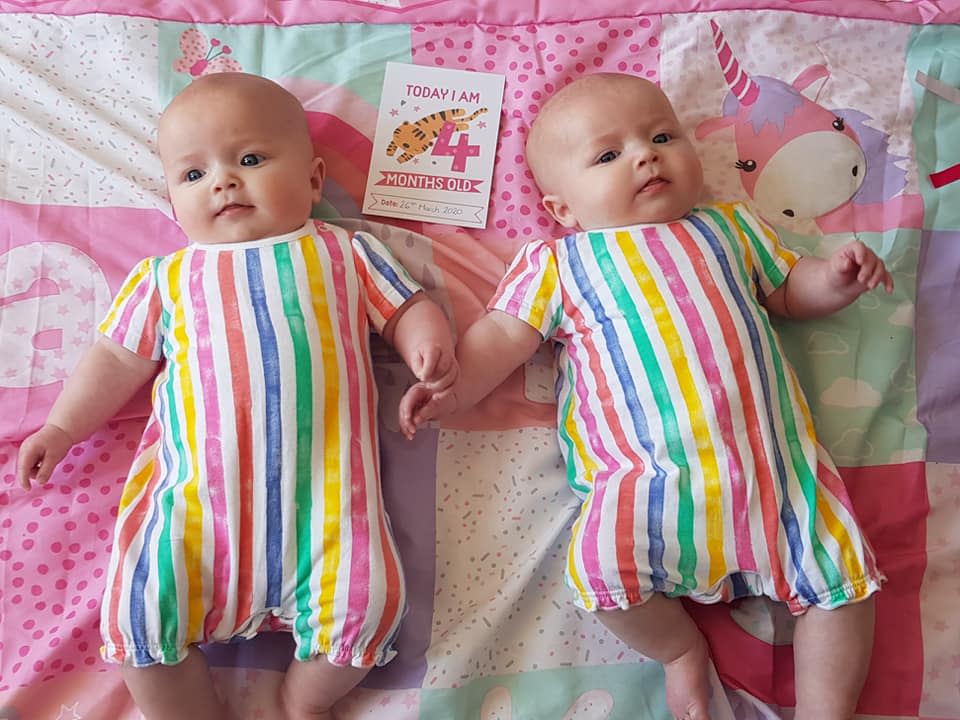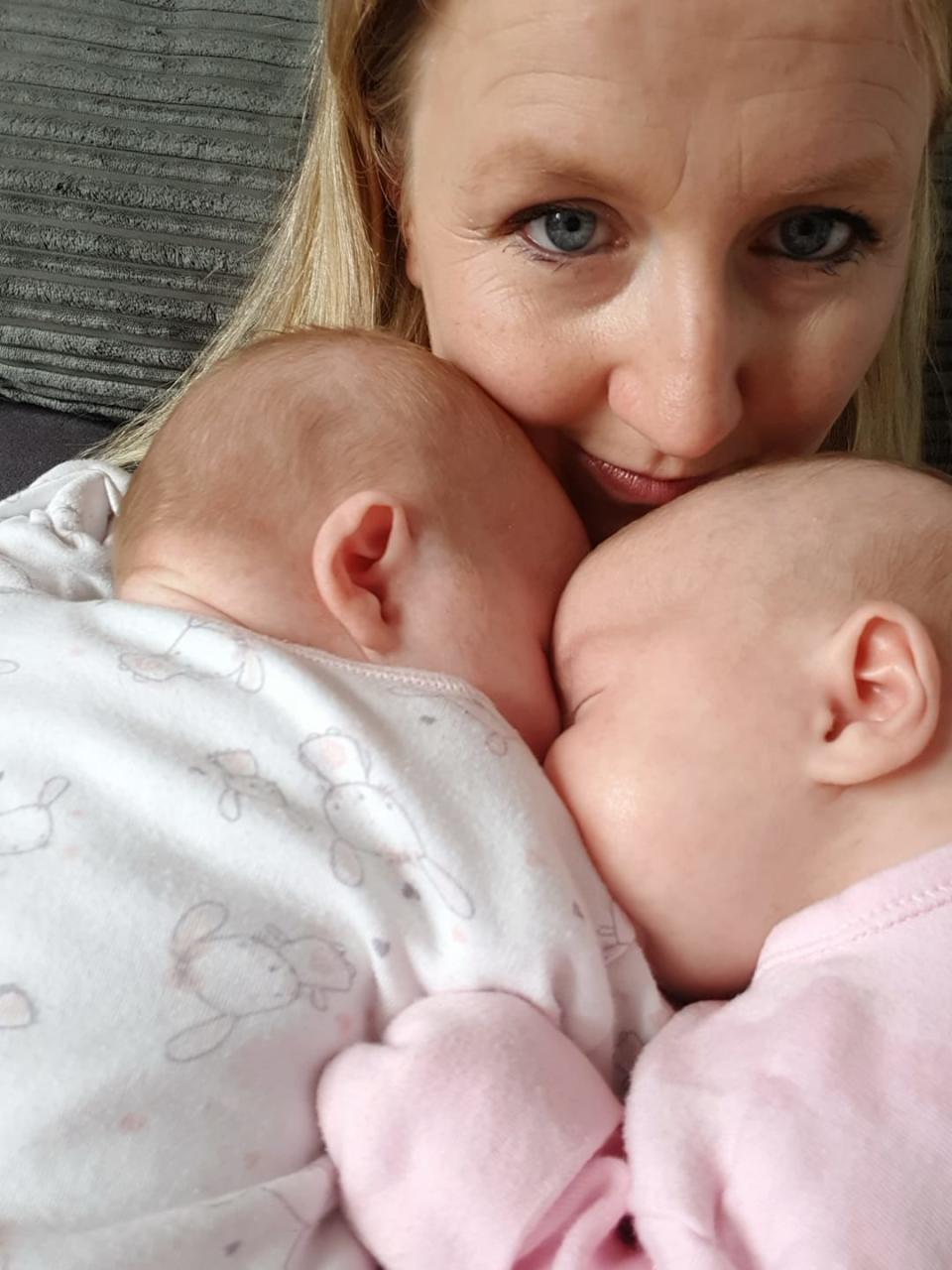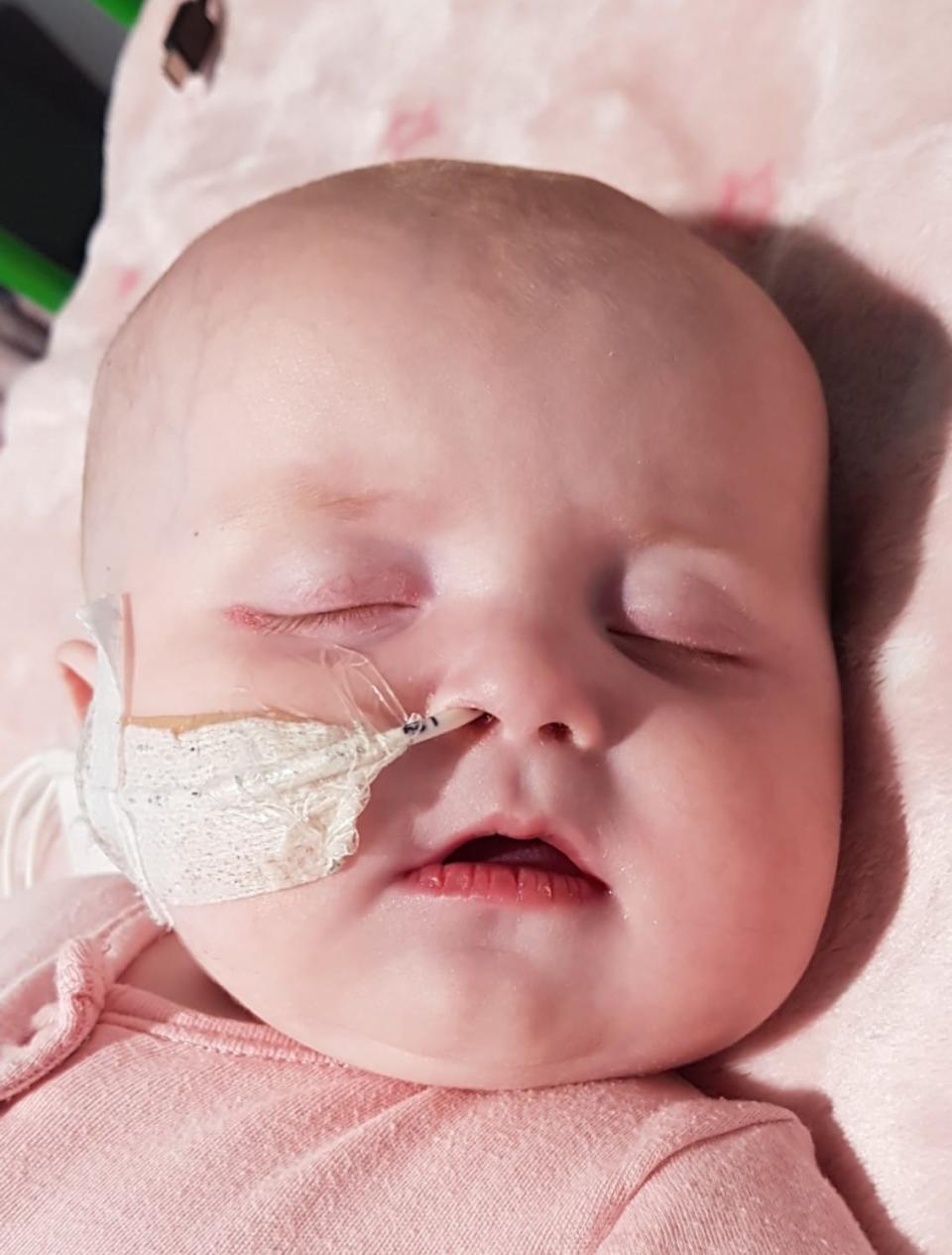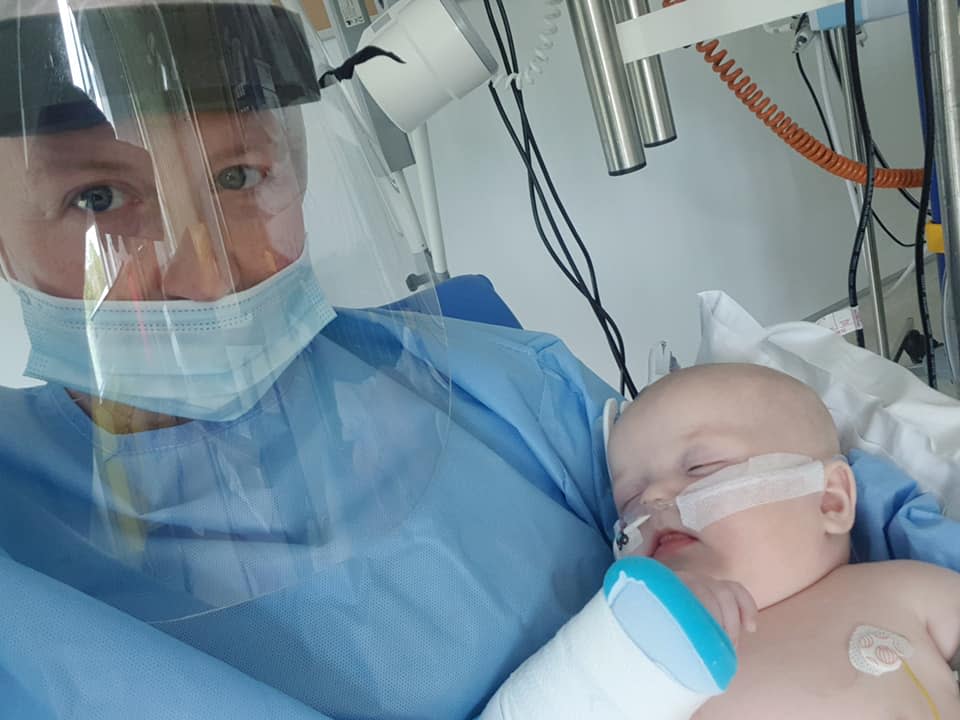Coronavirus: Baby develops life-threatening inflammatory condition 'while her twin escapes unscathed'

A mother of identical twins has revealed how one suffered a life-threatening illness after overcoming the coronavirus, while the other is thought to have escaped unscathed.
Hannah Godwin, 35, noticed her five-month-old daughter Leia had a rash and fever while lying next to her “healthy and happy” sister Thea.
Leia was rushed to hospital, where doctors diagnosed her with a mysterious inflammatory condition.
Blood tests later revealed the youngster has beaten the coronavirus, despite never showing symptoms.
NHS doctors have been told to look out for signs of “multi-system inflammation” after intensive care units in London saw eight children with unusual symptoms, some of whom tested positive for the coronavirus.
Leia has spent the past three weeks in hospital, while Thea is at home in Risca, Wales.
Although Leia is no longer in critical care, doctors have warned she has a long road to recovery.
Early research suggests the coronavirus is mild in four out of five cases, however, it can trigger a respiratory disease called COVID-19.

“God knows what could have happened if she hadn't had the treatment she had early on,” said Godwin.
“I'm so glad we noticed the difference in the girls.”
Latest coronavirus news, updates and advice
Live: Follow all the latest updates from the UK and around the world
Fact-checker: The number of COVID-19 cases in your local area
Explained: Symptoms, latest advice and how it compares to the flu
Doctors have likened the mysterious inflammation to Kawasaki disease.
This is a rare condition that usually affects children under five and causes blood vessels to become inflamed, leading to heart complications in around a quarter (25%) of patients.
Left untreated, complications can be fatal in 2% to 3% of youngsters.
Although unclear, Kawasaki disease is thought to be due to an overreaction of the immune system to an infection.
Doctors have requested genetic testing to better understand why Leia’s body reacted as it did.
They also want to take blood from Thea to see if she has had the coronavirus and, if so, investigate why her body did not react the same way.
‘It just went really out of hand, really quickly’
Godwin took Leia to the Royal Gwent Hospital in Newport.
“While there her temperature spiked,” she said.
“That's when they found the pin-prick rash on her feet”.
Doctors did not initially think Leia may have had the coronavirus.
“They started treating straight away for sepsis and meningitis,” said Godwin.
Over the next few days, Leia’s breathing became laboured and she was transferred to critical care.
“She went through a really, really scary time,” said Godwin.
“It just went really out of hand, really quickly.”
Doctors noticed Leia’s arteries had swollen to a “life-threatening size”.
“The consultant was very, very honest with me and said: ‘If there's a rupture she's not going to survive’”, said Godwin.
Leia was then transferred to the specialist Noah’s Ark Children’s Hospital for Wales in Cardiff, where she tested positive for antibodies to the coronavirus and was treated in isolation.
Antibodies are immune-fighting proteins released in response to an infection.
Once an individual has overcome the infection, memory antibodies circulate in low levels in the bloodstream to prevent the virus taking hold again.
Antibody tests tell medics a person has had a specific infection.
Doctors suspect Leia developed the Kawasaki-like disease, which has no set method of diagnosis.
“When doctors kept using the term 'linked to coronavirus' to me I was getting frustrated when she's never had it,” said Godwin.
“But they did an antibodies test and it came back positive, meaning at some point in the last five months she has had it but was asymptomatic.”
Leia is no longer in intensive care, with her mother able to give her oral medication in hospital.
The youngster is also given two blood thinning injections every day to prevent clots.
Godwin and her husband Simon, 33, have been visiting while also looking after Thea and their older daughters Gracie, nine, and Nia, 12.
Although Leia is still in hospital, Godwin insists she is doing well.
“She is fine in herself, you wouldn't know she was ill, and she's as strong as it gets so I'm sure we're just waiting it out,” she said.
Godwin is speaking out to raise awareness of the inflammatory disorder.
A spokesman for Public Health Wales said: “In recent weeks, paediatricians and paediatric intensive care specialists have identified a small number of children presenting to hospitals across the UK with signs of circulatory shock and a hyper-inflammatory state.
“Some children presented with symptoms similar to toxic shock syndrome (TSS) and others had symptoms consistent with Kawasaki disease, a rare inflammatory condition.
“Investigations by The Royal College of Paediatrics and Child Health, as well as clinicians from across the UK, are ongoing to learn more about this rare condition.”

Coronavirus: What we know about the Kawasaki-like disease
The vast majority of coronavirus complications worldwide have occurred in the elderly or already ill, with youngsters largely escaping unscathed.
Nevertheless, doctors have spotted signs of a Kawasaki-like disease post-infection in some children.
Symptoms usually include fever, rash, red eyes, dry or cracked lips, swollen lymph nodes, and redness on the palms and soles of the feet.
Doctors have also drawn parallels to TSS, often associated with tampon use.
TSS – a medical emergency – can cause fever, flu-like symptoms, nausea, vomiting and difficulty breathing.
Experts have warned these symptoms are a sign the body is overwhelmed as it tries to fight an infection.
Speaking at a Science Media Centre briefing, Professor Russell Viner – president of the The Royal College of Paediatrics and Child Health – previously pointed out the number of coronavirus deaths among children in the UK could be counted on two hands.
He estimated between 75 and 100 youngsters across the country have been admitted to hospital with the Kawasaki-like disease.
“The total numbers of children who get this syndrome are very small,” said Professor Viner.
“Around 5,000 children die tragically each year. Some of these are premature babies, but 160 to 170 die in car crashes. Those deaths are tragic but also rare.
“How do we manage those? We buy child seats, we use seat belts, we sometimes buy better cars; but we don’t stop driving.
“This syndrome is much, much more rare than car accidents involving children”.
As of 27 April, NHS England knew of fewer than 20 cases where an association between the coronavirus and the Kawasaki-like condition had been noted by doctors, the BBC reported.
NHS England issued an urgent alert to GPs to be aware of the condition, but stressed no link had been established with the coronavirus.
At least 15 US states are looking into the rare inflammatory disorder, according to New York governor Andrew Cuomo.
Professor Alastair Sutcliffe, from University College London, previously said: “There is apparently a small risk but no grounds for panic”.

What is the coronavirus?
The coronavirus is one of seven strains of a virus class that are known to infect humans.
Others cause everything from the common cold to severe acute respiratory syndrome (Sars), which killed 774 people during its 2002/3 outbreak.
Since the coronavirus outbreak was identified, more than 4.8 million cases have been confirmed worldwide, according to Johns Hopkins University.
Of these cases, over 1.7 million are known to have “recovered”.
Globally, the death toll has exceeded 318,700.
The coronavirus mainly spreads face to face via infected droplets expelled in a cough or sneeze.
There is also evidence it is transmitted in faeces and can survive on surfaces.
Symptoms include fever, cough and slight breathlessness.
The coronavirus has no “set” treatment, with most patients naturally fighting off the infection.
Those requiring hospitalisation are given “supportive care”, like ventilation, while their immune system gets to work.
Officials urge people ward off infection by washing their hands regularly and maintaining social distancing.




